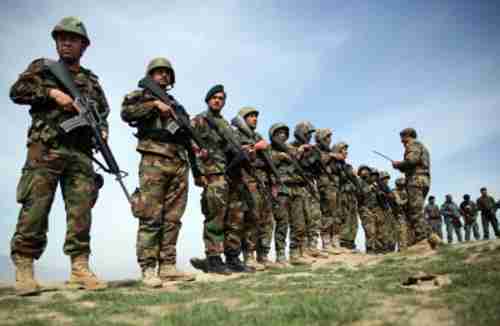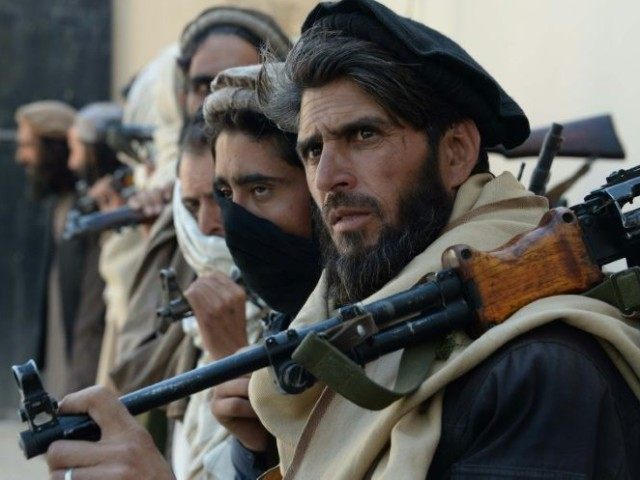This morning’s key headlines from GenerationalDynamics.com
- Taliban reject Pakistan pressure on Afghanistan peace process
- Bomb blast on bus in Peshawar, Pakistan kills 15
Taliban reject Pakistan pressure on Afghanistan peace process

Afghan soldiers stand guard Tuesday (AP)
As American and Nato forces withdraw from Afghanistan, an important lynchpin of the “peace process” to bring peace between the Afghan government and the Afghan Taliban is that Pakistan can pressure the Taliban to accept a peace deal. The Pakistanis have leverage over the Taliban, since the Afghan Taliban depend on safe havens in Pakistan where they can avoid hot pursuit by Afghan security forces.
Pakistani officials met with the Taliban Supreme Council in a secret meeting about two weeks ago, and threatened to expel Afghanistan’s Taliban from its bases in Pakistan if they did not join the Afghan peace talks scheduled for early March. Instead, the Taliban rejected the demands.
The reason is that, by this time, Pakistan’s threat is pretty much an empty threat. When Nato and American forces were fully engaged in Afghanistan, the Taliban had nowhere to hide in Afghanistan, and had to flee to Pakistan. (The irony was that the headquarters of the Afghan Taliban was in Pakistan, while the headquarters of the Pakistan Taliban was in Afghanistan.)
However, as American and Nato forces have been drawn down, the Taliban have been taking control of more and more of Afghanistan. This means that safe havens in Pakistan are not needed as much.
As we reported in December, a Department of Defense assessment found that the security situation in Afghanistan was deteriorating, and this deterioration has continued. The Taliban insurgency has expanded since foreign troops left the country in 2014 and as Afghans have become increasingly fed up with a government seen as weak and corrupt. Afghan army, police personnel and security forces have suffered from heavy casualties, desertions and low morale since then.
In November 2009, President Obama announced the “surge” that would last for 18 months: “I have determined that it is in our vital national interest to send an additional 30,000 U.S. troops to Afghanistan. After 18 months, our troops will begin to come home.”
To the surprise of no one, President Obama has been repeatedly forced to extend the 18-month deadline. In the latest version of the withdrawal plan, the US will maintain its current force of 9,800 in the country through 2016, and after that will leave a force of 5,500 troops in place to train Afghan forces and conduct counter-terrorism missions.
Currently, U.S. commanders in Afghanistan can strike the Taliban only when its fighters pose a direct threat to U.S. forces or when Afghan troops are in grave danger of being overrun. Gen. John F. Campbell, the outgoing commander of U.S. and international forces in Afghanistan, has made a request to broaden authorities to once again permit offensive strikes against the Taliban. The request has apparently been rejected by the White House, exposing what may be a major rift between the military and senior administration officials over the U.S. role in the war in Afghanistan.
For the Taliban, this is particularly bad timing for a “peace process,” since the warm weather is coming and the Taliban are about to launch their annual fighting season. According to one senior Taliban official:
We already have started focusing on the spring offensive, and that’s why the majority of the fighters and commanders are going there (Afghanistan).
The Taliban plan is to gain more territory. Whether the Afghan Taliban will even need their safe havens in Pakistan in the fall remains to be seen. Reuters and Washington Post and South Asia Terrorism Portal (SATP – India)
Bomb blast in bus in Peshawar Pakistan kills 15
In Pakistan, terrorist bomb explosions are almost as common as traffic accidents, and Wednesday was no exception. A powerful bomb, detonated by a timing mechanism, exploded in a bus carrying government employees in Peshawar on Wednesday, killing at least 15 people and causing injuries to 25.
Lashkar-e-Islam, a militant group allied with the Pakistani Taliban, claimed responsibility for the attack, saying it was to avenge a military court’s sentencing of 13 militants to death on March 15.
The bus is normally parked overnight at a petrol station, and that may be when the bomb and timer were inserted. The police didn’t inspect the bus before it left on its route because it was privately-owned, and it was the responsibility of the contractor to perform security checks.
Peshawar has seen scores of attacks on civilians as well as law enforcement personnel in the past. The city is also the home to the XI Corps, an administrative corps of the Pakistan Army which manages all military activity in KP and is currently engaged in a full-blown operation against the Taliban in North Waziristan. Pakistan Today and Dawn (Pakistan) and RFE/RL
KEYS: Generational Dynamics, Afghanistan, Taliban, Pakistan, John F. Campbell, Peshawar, Lashkar-e-Islam
Permanent web link to this article
Receive daily World View columns by e-mail

COMMENTS
Please let us know if you're having issues with commenting.